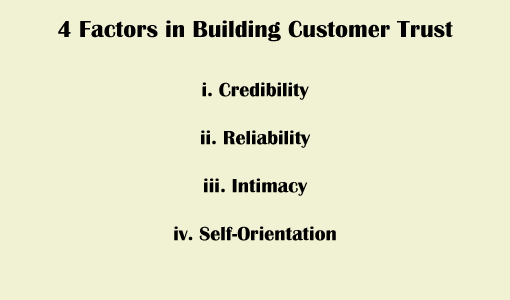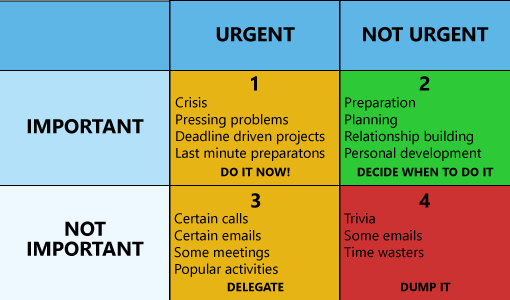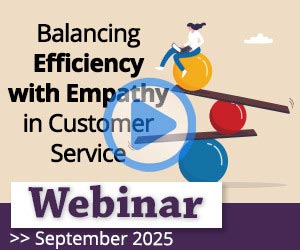In this article, we explore how contact centre advisors can build trust with customers, while improving overall customer relationships.
Have you ever thought about how important trust is when you are trying to build a relationship? That could be either a relationship with a customer over the phone or a more personal relationship.
If you think about people you have a great relationship with, there will be many factors contributing to why it’s so great. But one of the major contributors will be trust.
But what makes us trust some individuals and most definitely not trust others?
The Four Factors of Building Trust
According to trustedadvisor.com, there are four factors to building trust. The first three involve improving credibility, reliability and intimacy, while the fourth is lowering self-orientation

Each of these four elements of trust can be applied to the contact centre, as discussed further below.
Credibility
As well as knowledge, the key to credibility is communication. Can advisors communicate their message in a way that helps customers relate to what they are talking about?
If customers are confused by an advisor’s comments, because they simply cannot relate to them, then the customer is unlikely to be paying them much attention.
Remember that if an advisor loses the customer’s attention, then they lose some essence of credibility, and therefore some element of trust.
How Can the Contact Centre Improve Its Credibility?
Here are four things that the contact centre can do to help boost advisor credibility over the phone.
1. Find Time to Assist Advisors with Knowledge Development
While communication is certainly key, the other key part of credibility is to ensure that advisors are knowledgeable about the product/services they are selling.
Their information must be current and should ideally be “topped-up” with continuous coaching, as the International Coaching Federation found that continuous coaching helps to:
- Improve work performance by 70%
- Improve self-confidence by 80%
- Improve communication skills by 72%
However, many contact centres seem unable to find the time for continual training. This is where activities like filling out a “personal effectiveness grid” like the one below prove useful as a way to create more time.

For more ideas of how to create more time for training, read our article: Being Super-Busy: The Modern Excuse for Not Coaching Staff
2. Allow Advisors to Practise What They Preach
Advisors are often tasked with instructing customers on how to best use a product/service, or for similar guidance. However, this can be tricky when they have not come into contact with the product themselves.
Many contact centres provide advisors with user guides on their desktops. However, Sky’s contact centre in Stockport goes one step further by bringing new products into the contact centre, giving advisors the chance to test them out for themselves during refresher training sessions.
This better equips the team to help customers who have any problems related to that product, adding to their credibility.
3. Make Training Relevant
During training sessions, don’t just bore the team with lots of theory. Instead, bring the message to life by using examples that advisors can relate to.
Listen back to call recordings with the team and have a group discussion about what can be improved and talk about what each advisor would have done differently if they had been handling the same call.
In these examples, it could be good practice to listen to a call recording from an advisor who used too much push communication – i.e. where they bombarded the customer with too much information.
By “pushing” the customer onto one product or service, the advisor may not be doing their best to appear credible, so advisors should instead be taught the value of pull communication.
Pull communication, which involves asking the customer a number of questions to draw information from them, allows the advisor to better attach a product/service to the customer’s needs.
4. Be Honest With Customers
Appearing to be credible doesn’t always mean that the organisation has to always be right, as every business makes mistakes. But advisors must be honest and take ownership of these issues.
Mistakes are an opportunity to engage customers more with the brand, to show them the bigger picture and the background behind the decisions made.
Mistakes are an opportunity to engage customers more with the brand, to show them the bigger picture and the background behind the decisions made.
If an advisor was able to take complete control of the issue and take ownership of the mistake, which may have been made by a different department within the organisation, they can give themselves the opportunity to turn a negative experience into a positive one.
Reliability
There may be times when members of the contact centre team are unreliable. However, they will almost always mean well.
This scenario happens when people struggle to say no, so they say yes to everything, but they can’t possibly do it all.
So what happens? They end up letting some people down. As a result, those people will not see them as reliable. They may take a chance on them if it was something unimportant, but they would avoid those agents if it was a task that mattered.
Is there anyone who can honestly say they have never promised to do something and then not done it? Probably not.
However, if that becomes a regular occurrence, it does negatively affect the contact centre’s reliability and thereby their trustworthiness.
How Can the Contact Centre Improve Its Reliability?
Here are three ways in which advisors can be more reliable in the eyes of the customer.
1. Ask Advisors to Be Honest About Their Workload
An example of when it is important for an advisor to be honest is when handling live chats.
For instance, if a team leader was concerned that the team was not hitting the target service level on live chat, they might ask each advisor to take four contacts at a time instead of three.
However, if an advisor was struggling to handle three customers, each of whom was really engaged in the conversation, taking on a fourth may lead to long delays and a lower quality of response. The four customers may then deem the advisor to be unreliable.
So if advisors are feeling under stress, it’s important that they are confident to speak about it to the team leader/management. This very much hinges on contact centre culture.
For more about culture, read our article: Create and Maintain a Positive Culture
2. Keep Promises
If an advisor says that they are going to do something for a team member, it is important that they schedule time to get it done.
Why is this important? Because if one advisor asks for help from another advisor who proves to be unreliable, the customer will be left waiting and deem the advisor they have been in contact with to be unreliable.
So, think about asking advisors to pose enough questions so they can clarify exactly what is involved and confirm timescales. If everyone in the contact centre were to do this, a culture of reliability would grow, allowing advisors to meet customer requests in a timely manner.
3. Encourage Advisors to Learn From One Another
There are lots of ways to develop skills. Just look around you, I’m sure there is someone you work with who is very organised. What do they do differently? Ask them and learn from them.
The same logic can be applied to the contact centre advisor role. If the team were encouraged to share tips with one another, they can find ways to greater improve their focus and listening ability, to appear more reliable to the customer.
Schedule a time to respond to emails, so each member of the team can remain focused on their current task.
One simple tip, which can work beyond the remit of the contact centre, is to schedule a time to respond to emails instead of reading them as soon as they pop up on the screen, so each member of the team can remain focused on their current task.
Even better, switch off the pop-up email alert. As a team leader or a contact centre manager, you’ll know how emails can be a distraction that take up a large part of your day.
Intimacy
This is not only about how well people know you as a person, but also how comfortable they feel opening up to you.
When it comes to the contact centre, advisors should consider if the customer feels comfortable enough to be honest with them. Does the customer feel that they are empathetic? This is about customers trusting the advisor enough to take them into their confidence.
As a general principle, intimacy is also about how much people feel they can share with you in confidence. So, building relationships in the contact centre is key.
How Can the Contact Centre Improve Its Intimacy?
Here are three ways that the contact centre can coach its advisors to build relationships on the phone.
1. Train Advisors to Use Empathy
Empathy is not about jumping in and trying to problem-solve. It’s about listening and understanding the feelings the customer is relaying and thereby naming those feelings when responding to them.
For example, “It sounds like you are frustrated because of this, Mrs Smith. Is that how you’re feeling?” This gives Mrs Smith the opportunity to agree or clarify exactly how she feels.
That is much better than saying “I understand.” We’ve all heard that response. But does the advisor really understand? This response could be considered presumptive and cause customers to react negatively.
For a list of our recommended empathy statements, read our article: 18 Empathy Statements That Help Improve Customer-Agent Rapport
2. Ask Advisors to Refrain From Going Straight Into Problem-Solving Mode
Before jumping in and going into problem-solving mode, it is good practice for advisors to ask the customer “what would you like to do?”
Perhaps the customer just wants the advisor to listen. They may want to hear their opinion, but the advisor should wait to be told to share it! If this is the case, then the advisor has received permission to offer their opinion.
Remember that not every customer is after the same solution.
Also, the team should be asked to remember that not every customer is after the same solution. If the advisor has handled a similar query before and jumps straight into a solution they used previously, they may be missing an alternative solution that is better suited to that particular customer.
So, before thinking about the solution, remember to listen actively to what the customer is saying.
3. Practise Listening Skills
Leading on from the last point, advisors should make a point to avoid immediately coming to a conclusion about a solution and remember to listen actively to what the customer is saying.
But what does “listen actively” mean? Well, active listening hinges on a number of key skills including: detecting emotions, staying focused and asking relevant questions.
Only by REALLY listening to the customer can the advisor form any sort of relationship with them beyond a transactional level.
For more advice on developing active listening, read our articles: Ten Tips to Improve Listening Skills on the Telephone and How to Train Active Listening in the Contact Centre in 4 exercises
Self-Orientation
Self-orientation has a very big impact on trust. In the wider world, this is about how much the people around you feel that you truly care about them and their needs. It’s not all about you and your goals.
So, for advisors in the contact centre to be effective, they must understand that although they may have their preferred style, it is important to demonstrate the right style for the right customer and the right situation.
Therefore, it is important to reduce self-orientation, which is why it is the denominator in the trust equation.
How Can the Contact Centre Lower Self-Orientation?
Here are three ways in which the contact centre can help advisors to boost their focus on the customer and lower self-orientation.
1. Remind Advisors of Who the Most Important Person in the Conversation Is
As Carolyn Blunt of Ember Real Results says in a previous Call Centre Helper article on developing listening skills, contact centres need to beware of hiring secret narcissists.
Contact centres need to beware of hiring secret narcissists.
Carolyn Blunt
While these extroverts certainly have their strengths in terms of bringing great energy to the contact centre, they tend to like the sound of their own voices a little too much, which damages their listening ability and an customer’s ability to trust them.
However, due to their nature, contact centres do attract mostly extroverts. So, as Carolyn says, make sure you teach them to ask more questions and train them to use pull communication.
2. Ask Advisors to Think of Customers as Teammates
No matter how good an advisor’s knowledge is, they can achieve greater levels of satisfaction by working with the customer as a “team”, as opposed to individually.
What is meant by this is that it is good for advisors to engage with the customer’s vision, rather than imposing their vision on them.
So, it can be good for advisors to use words like “we”, “our” and “us”, not in the corporate sense (i.e. me and the company), but as in “me and you”. For example: “What I think we should do next is…”
3. Lead by Example
If, as a leader, your ultimate purpose for getting out of bed each morning is to make a name for yourself, earn more money and climb the career ladder, then you may need to re-evaluate your purpose.
If you are a leader and your ‘WHY’ is not focused around your team, then they will see you demonstrate the behaviour of a leader who is solely focused on your own goals. Advisors will see you as someone who does something for yourself and not for them.
Earning more money and climbing the career ladder are results and not a purpose.
This can be dangerous, as such leadership may create a culture of self-orientation, meaning that advisors transfer this behaviour onto customers.
Remember, earning more money and climbing the career ladder are results and not a purpose.
Building Customer Trust
Let’s reconsider the customer trust equation. By applying it to the contact centre, we have established that there are four key things that the contact centre needs to do, in order for their advisors to seem trustworthy.

Jacqui Turner
These four things are as follows:
- Build credibility by continuously improving advisor knowledge
- Build reliability by improving culture
- Build intimacy by boosting soft skills (i.e. listening and empathy)
- Lower self-orientation by changing behaviours
If the contact centre can do each of these things for the team, the chance that customers will invest their trust in advisors will grow rapidly.
Would you add to our list of four things to help build trust in the contact centre? If so, what would you add?
Please share your thoughts in an email to Call Centre Helper.
Thanks to Jacqui Turner at Turner Corner Learning Solutions for her help in putting this article together.
Author: Robyn Coppell
Published On: 18th Apr 2018 - Last modified: 14th Aug 2025
Read more about - Customer Service Strategy, Carolyn Blunt, Editor's Picks, Ember, Empathy, Jacqui Turner, Knowledge Management, Listening, Rapport, Service Strategy, Soft Skills, Training and Coaching






































